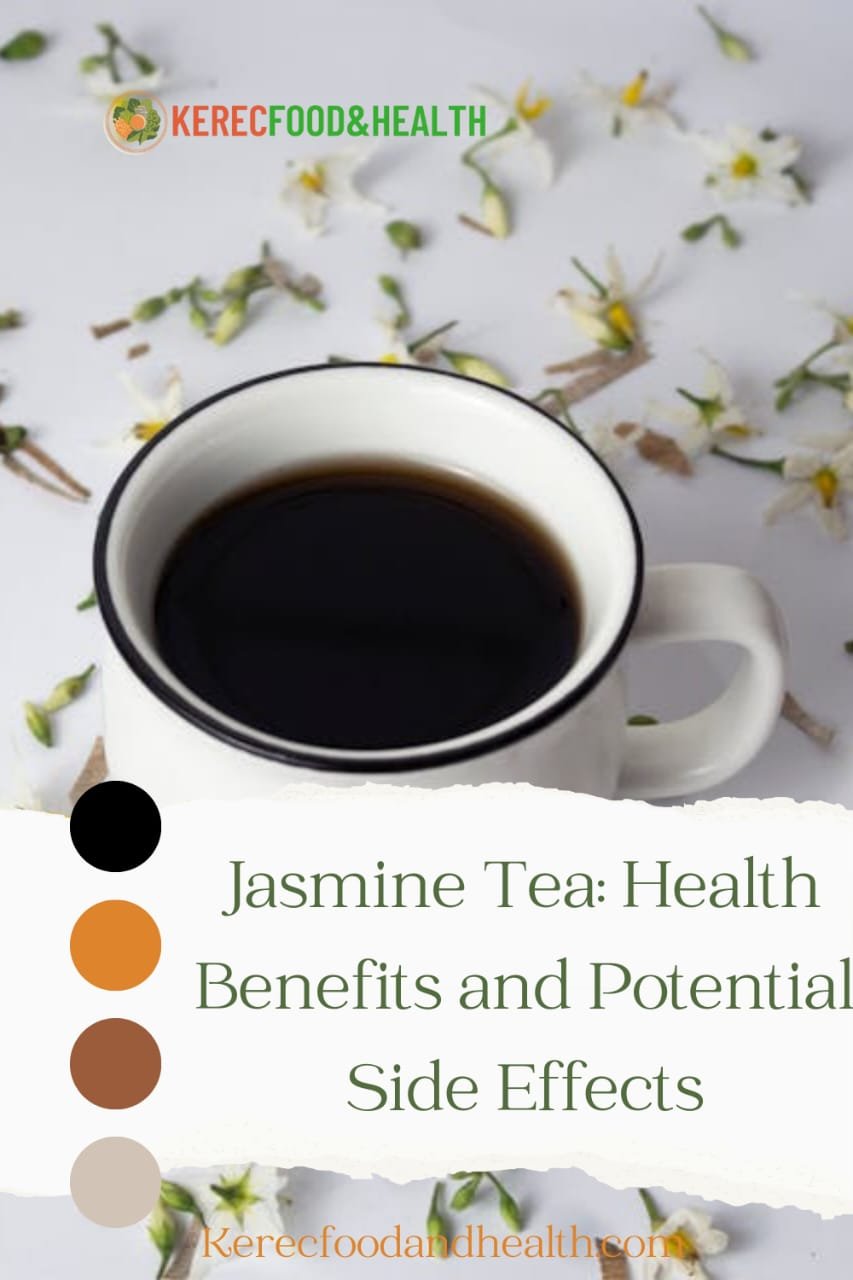Discover the health benefits of jasmine tea, including its calming effects and heart support, alongside potential side effects to consider.
Jasmine tea is not just a delightful beverage; it also offers a wealth of health benefits that have fascinated tea enthusiasts for centuries. Infused with the delicate aroma of jasmine flowers, this tea primarily uses green or white tea as its base, both renowned for their rich antioxidant properties. Moreover, studies suggest that jasmine tea may help promote relaxation, enhance heart health, and even support weight management.
However, it is essential to consider that, like any herbal infusion, jasmine tea comes with potential side effects. While it provides numerous advantages, individuals sensitive to caffeine or certain compounds should be mindful of their consumption. In this blog post, we will explore the remarkable health benefits of jasmine tea, examining its effects on mental well-being, digestion, and overall wellness. Additionally, we will address the possible side effects, allowing you to make informed decisions about incorporating this fragrant tea into your daily routine. By understanding both its benefits and drawbacks, you can enjoy jasmine tea while prioritizing your health and well-being.
7 Amazing Health Benefits of Jasmine Tea
Beyond its enchanting flavor and aroma, Jasmine Tea also offers a host of health benefits.
1. Enhance Gut Health
Numerous studies emphasize the significance of maintaining good gut health for overall well-being, from the immune system to mental health. Fortunately, jasmine tea can contribute to improving gut health too. Rich in polyphenols acting as prebiotics, jasmine tea nourishes the microbiome and promotes gut health. Animal studies indicate that jasmine tea increases cellular antioxidants and decreases inflammation, fostering an environment for optimal gut health.
2. Boost Brain Function
The modest caffeine content in jasmine tea can significantly impact brain function. With approximately 15-60mg of caffeine per serving, jasmine tea accelerates the nervous system, enhancing brain function and facilitating efficient communication between the brain and body. Additionally, jasmine tea triggers the release of dopamine and serotonin, promoting feelings of happiness and contentment.
3. Cardiovascular Health
By incorporating jasmine tea into your routine, you can help regulate cholesterol levels and protect the health of your heart cells. Catechins abundant in jasmine tea have been found to inhibit LDL-oxidation, thus reducing “bad” cholesterol levels. Preventing oxidizing processes in the arteries and veins contributes to reduced inflammation and lowers the risk of cardiovascular issues such as strokes and heart attacks.
4. Regulate Blood Sugar Levels
Individuals at risk of or managing type 2 diabetes can benefit from incorporating jasmine tea into their daily habits. Jasmine tea, particularly when based on green tea, is rich in ECGC compounds that improve insulin utilization and assist in lowering blood sugar levels.
5. Enhance Oral Health
Jasmine tea can promote good oral health by keeping teeth clean, strong, and fresh. Catechins, found in green tea-based jasmine tea, offer benefits similar to those of antiseptic mouthwashes. Research suggests that jasmine tea can combat bad breath by targeting bacteria responsible for oral odor.
6. Rich in Antioxidants
Indulge in a cup of jasmine tea to reap the benefits of powerful antioxidants, essential polyphenols, and beneficial catechins that combat free radicals in the body. Among these compounds, epigallocatechin gallate (EGCG) stands out, offering a multitude of health benefits such as supporting heart health, maintaining oral hygiene, and reducing inflammation.
7. Reduce the Risk of Stroke and Heart Attack in Men
Including jasmine tea in your routine can mitigate heart disease and stroke risks, particularly for men prone to these health concerns. The antioxidants and catechins in jasmine tea have been linked to lowering triglyceride levels and minimizing bad cholesterol in the body, thereby supporting heart health and reducing stroke risks. Clinical trials have underscored the correlation between jasmine tea consumption and healthy cholesterol levels, emphasizing the tea’s contribution to cardiovascular health.
8. Achieve Radiant Skin Naturally
Embrace luminous and glowing skin by introducing jasmine tea into your daily routine. With its deep cleansing properties, jasmine petals are renowned for promoting natural healing in the skin. Additionally, consuming jasmine tea offers skin benefits as well. Research indicates that the polyphenols in tea play a role in healthy aging by combating free radicals that can lead to cell damage.
9. Reduce Cancer Risk
Outstanding compounds like antioxidants, polyphenols, and ECGC in jasmine tea are believed to possess cancer-fighting properties. Animal studies have demonstrated that the polyphenols present in green tea, the base of jasmine tea, can inhibit tumor cell growth, reduce tumor size, and hinder the spread of cancer cells. While further human studies are needed to corroborate these findings, incorporating fragrant jasmine tea into your regimen might aid in lowering the risk of developing severe health conditions.
10. Promote Sleep and Alleviate Insomnia
Despite containing a small amount of caffeine, jasmine tea can be a beneficial addition to your bedtime routine when consumed a few hours before sleep. The aroma of jasmine blossoms triggers a response in the parasympathetic nervous system, promoting relaxation and easing the mind. By calming the digestive system, jasmine tea can aid in preventing restlessness and promoting a peaceful night’s sleep. You should opt for pure jasmine tea or jasmine tea with a green tea base, which contains less caffeine than black tea, for a soothing bedtime ritual.
11. Achieve Weight Loss
With its metabolism-boosting properties, jasmine tea is regarded as a beneficial aid in shedding excess weight. Individuals striving to lose weight for health or medical reasons can incorporate jasmine tea into their weight loss journey. Low in calories and naturally sweet, jasmine tea helps curb sugar cravings, increases metabolism by up to 5%, and aids in burning fat by up to 16%.
12. Enhance Hair Health
Elevate the health of your hair by increasing your consumption of delightful jasmine tea. This fragrant tea not only promotes lush, thick locks but also maintains a healthy scalp to combat fungal or bacterial infections. Jasmine tea imparts shine to your scalp and, thanks to the caffeine content in the green tea base, may stimulate hair growth. Studies have indicated that green tea can contribute to preventing hair loss as well.
13. Improve Mental Health and Emotional Balance
The calming properties of jasmine aromatherapy have been shown to positively impact the nervous system, aiding in stress relief and emotional balance. The sweet floral scent of jasmine tea affects the central nervous system, historically used to alleviate symptoms of depression, stress, and anxiety. Jasmine oil influences the GABA chemical in the nervous system, with studies likening jasmine’s calming effect to that of valium, offering emotional support and balance during high-stress periods.
It’s important to note that while Darjeeling tea offers potential health benefits, individual experiences may vary. It’s always recommended to consume tea in moderation and as part of a balanced diet. Additionally, people with certain health conditions or those taking medications should consult with a healthcare professional before making significant changes to their diet.
Potential Side Effects of Drinking Jasmine Tea
The possible side effects, you could experience while drinking jasmine tea. Jasmine tea is a type of tea that is flavored with the scent of jasmine flowers. While jasmine tea is generally considered safe to consume, it can still have some side effects, especially when consumed in excessive amounts or by individuals who are sensitive to certain compounds. Here are some potential side effects of jasmine tea:
1. Allergic reactions:
Some individuals may experience allergic reactions to jasmine tea due to sensitivity to the jasmine flowers or tea leaves. Symptoms may include itching, hives, skin rashes, wheezing, difficulty breathing, or swelling of the face, tongue, or throat. If you experience any severe allergic reactions, seek immediate medical attention. Also, if you have a known allergy to jasmine or other flowers, it’s best to avoid Jasmine Tea or consult with a healthcare professional before consuming it.
2. Caffeine sensitivity:
Jasmine tea is typically made from green tea leaves, which naturally contain caffeine. While moderate caffeine consumption is generally safe for most people, if you are sensitive to caffeine or consume excessive amounts of jasmine tea, it can lead to side effects such as insomnia, nervousness, increased heart rate, digestive issues, or restlessness.
3. Stomach discomfort:
Drinking large amounts of jasmine tea or consuming it on an empty stomach may cause stomach discomfort, including bloating, acidity, gas, nausea, or stomach cramps. This effect is more likely with higher caffeine content teas like green tea, which is often used as the base for Jasmine Tea. It is advisable to consume jasmine tea in moderation
4. Interaction with Medications:
Jasmine Tea may interact with certain medications, particularly those affected by caffeine or compounds found in tea. These interactions can alter medication effectiveness or increase the risk of side effects. If you’re taking prescription medications, especially those with narrow therapeutic windows like blood thinners or certain antidepressants, consult with your healthcare provider before adding Jasmine Tea to your diet.
5. Pregnancy and Breastfeeding:
Due to its caffeine content, excessive consumption of Jasmine Tea during pregnancy or breastfeeding may pose risks to the fetus or infant. High caffeine intake has been associated with complications such as low birth weight, preterm birth, and miscarriage. Pregnant and breastfeeding individuals should limit their caffeine intake and consult with a healthcare provider for personalized guidance.
6. Bone Health:
Some research suggests that excessive caffeine consumption may interfere with calcium absorption and contribute to bone density loss over time. While moderate Jasmine Tea consumption is unlikely to have a significant impact on bone health, individuals at risk of osteoporosis or with existing bone conditions may want to monitor their caffeine intake.
7. Teeth Staining:
Like many teas, Jasmine Tea may contribute to teeth staining, particularly if consumed regularly over time. To minimize staining, it’s advisable to practice good oral hygiene, including regular brushing and dental checkups.
Overall, while Jasmine Tea can be a delightful addition to a balanced diet, it’s essential to consume it in moderation and be mindful of individual sensitivities and health conditions. If you experience any adverse effects after consuming Jasmine Tea, discontinue use and consult with a healthcare professional.
In Conclusion
Jasmine Tea is more than just a beverage; it’s a sensory experience steeped in tradition and craftsmanship. From its origins in ancient China to its global popularity today, Jasmine Tea continues to captivate tea enthusiasts with its delicate flavor, intoxicating aroma, and myriad health benefits. So, the next time you seek a moment of respite from the hustle and bustle of daily life, brew yourself a cup of Jasmine Tea and embark on a journey of tranquility and taste.
Reference
- Matt Caron. Jasmine Tea Benefits 13 Amazing Advantages of Drinking Jasmine Tea. https://www.myteadrop.com/blogs/news/jasmineteabenefits
- 10 Reasons Why Jasmine Tea Is Good for You. Nov 06, 2023. https://www.goldentipstea.com/blogs/all/10reasonswhyjasmineteaisgoodforyou
- What is Jasmine Tea? https://www.teatulia.com/teavarieties/whatisjasminetea.htm
- Jasmine Tea: Are There Health Benefits? WebMD Editorial Contributors and Jabeen Begum. September 10, 2022.
- Health Benefits of Jasmine, Uses Tea and Its Side Effects. Aug 31, 2020. https://www.lybrate.com/topic/benefitsofjasmineteaanditssideeffects






Pingback: How Osage Orange Health Benefits Can Improve Your Health